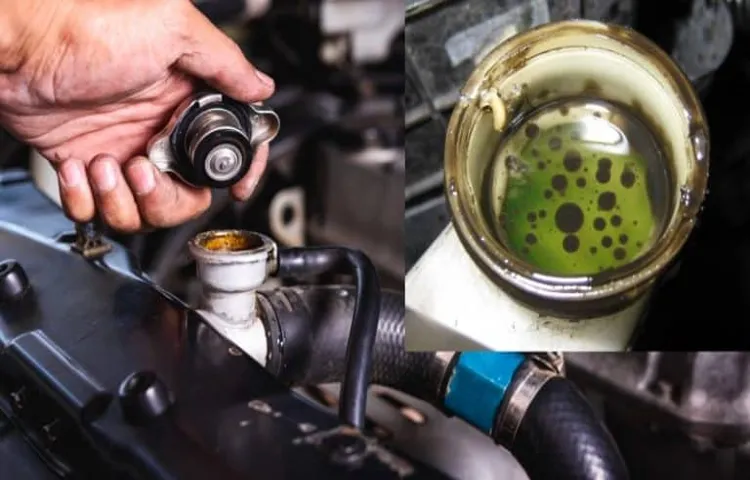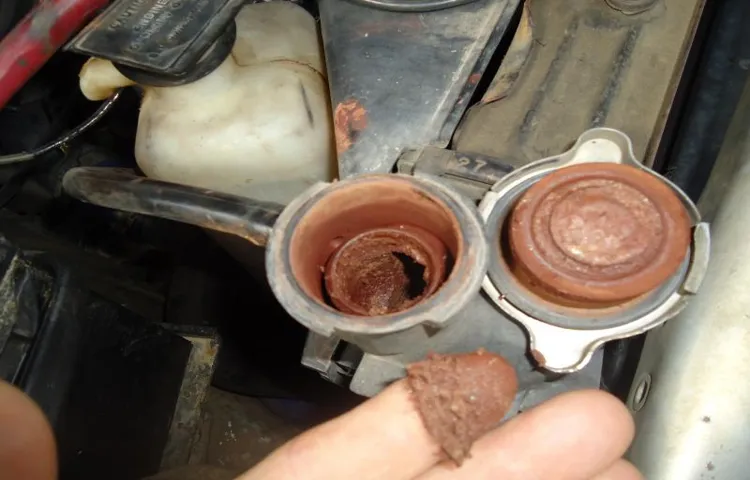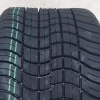Have you noticed a milky substance on your car’s oil dipstick or a foamy residue on your engine or radiator cap? That could be the result of coolant mixing with your engine oil. This problem could lead to severe engine damage, and it’s crucial to address it promptly. But why does this happen? What causes coolant to mix with oil, and what can you do to fix it? In this blog, we’ll dive into this mystery and unpack the causes and solutions of coolant in oil problems.
So, buckle up and let’s get started!
Table of Contents
- 1 What is coolant and why is it important in a car?
- 2 How does oil work in a car?
- 3 What happens when coolant mixes with oil?
- 4 What are the common causes of coolant mixing with oil?
- 5 What are the consequences of driving with coolant in the oil?
- 6 How can you fix coolant mixing with oil?
- 7 Conclusion
- 8 FAQs
What is coolant and why is it important in a car?
“Why is there coolant in my oil?” is a common question among car owners. Coolant, also known as antifreeze, is an essential fluid in a car’s engine cooling system. It helps regulate the temperature of the engine by absorbing heat from the engine and carrying it to the radiator where it is dissipated into the atmosphere.
If coolant is present in the oil, it can be a sign of a serious problem, such as a damaged head gasket or a cracked engine block. When this happens, the coolant can mix with the oil, creating a milky substance that can prevent proper lubrication of engine components and damage the engine. It’s important to address this issue quickly by taking your car to a professional mechanic to avoid significant engine damage.
Routine maintenance, including regular checks of the coolant and oil levels, can help prevent this problem and ensure your car runs smoothly. Remember, keeping up with your car’s maintenance is crucial to its longevity and performance.
Definition of coolant and its function in an engine
Coolant is a liquid mixture of water and antifreeze that helps keep your car’s engine from overheating. The engine generates a tremendous amount of heat when it runs, and coolant works by flowing through the engine and absorbing that heat. It then travels back to the radiator, where it cools down before circulating through the engine again.
In addition to regulating temperature, coolant also helps prevent corrosion and rust buildup in the engine, which can lead to costly repairs over time. Without sufficient coolant, your engine could overheat, resulting in damage to the engine or even complete engine failure. So it’s essential to check your coolant levels regularly and have your coolant flushed and replaced according to your vehicle manufacturer’s recommended schedule.
By keeping your engine cool and lubricated, coolant helps ensure smooth and reliable performance on the road.

How does oil work in a car?
If you’re like most car owners, you’ve probably wondered how oil works in your car. Essentially, oil is like the lifeblood of your engine, working to lubricate its moving parts and keep everything running smoothly. It also helps to cool the engine by dissipating heat, which is why it’s so important to keep an eye on your oil level and change it regularly.
But why is there coolant in your oil? Well, if you’ve noticed a milky white substance on your dipstick or around the oil filler cap, it’s likely a sign of coolant mixing with your oil. This can happen for a few reasons, such as a blown head gasket or a cracked engine block. When this happens, the coolant can seep into the oil passages and mix with the oil, resulting in that milky appearance.
While it may seem like a minor issue, it’s important to address coolant in your oil right away. Driving with this mixture can cause serious damage to your engine, as the oil won’t be able to do its job of lubricating and cooling the moving parts. If you suspect that coolant is mixing with your oil, it’s best to take your car to a mechanic right away and have it checked out.
They can diagnose the issue and make any necessary repairs before it causes more damage.
Definition of oil and its function in an engine
Oil is a vital component of any engine, whether it’s a car, truck, or even a lawnmower. Its primary function is to lubricate the many moving parts within the engine, reducing friction and allowing them to perform smoothly. This is achieved through the oil’s chemical makeup, which consists of a base oil and various additives that improve its performance.
Some of these additives include detergents that keep engine components clean and prevent the buildup of sludge, as well as antioxidants that prevent the oil from breaking down under high temperatures. Oil also helps to cool the engine by absorbing heat generated during operation. Without oil, an engine would quickly become damaged due to excess friction and heat, leading to costly repairs or even complete engine failure.
In short, oil is essential to the proper function and longevity of any engine, making regular oil changes critical to maintaining your vehicle’s performance.
What happens when coolant mixes with oil?
If you find that there is coolant in your oil, it can be a cause for concern. This happens when the head gasket fails and allows coolant and oil to mix together. The head gasket is a critical component that separates the engine block from the cylinder head and prevents the mixing of different fluids.
When the head gasket fails, coolant can leak into the oil passages, leading to a milky and foamy appearance in your oil. This is a bad sign and means that something is seriously wrong with your engine. If left unaddressed, this can result in engine failure and costly repairs.
It’s essential to have your engine checked by a professional mechanic immediately if you notice any coolant in your oil to avoid further damage.
Explanation of potential engine damage from coolant mixing with oil
When coolant mixes with oil in the engine, it can cause serious damage to the vehicle. The two liquids have very different functions, and when they mix, they can’t do their jobs effectively. Coolant works to cool the engine, while oil lubricates the moving parts.
If they mix, the coolant can’t perform its cooling function and the oil can’t lubricate properly, causing friction and heat. The result can be catastrophic, with engine parts becoming damaged or warped. Over time, this can lead to complete engine failure.
It’s important to have any signs of coolant mixing with oil checked out immediately by a mechanic. Regular maintenance and keeping an eye on your vehicle’s fluid levels can help prevent this issue from occurring in the first place.
What are the common causes of coolant mixing with oil?
Finding coolant in your engine oil can be worrying and confusing. Common causes of this problem include a damaged head gasket, a cracked engine block, a damaged cylinder head or a bad intake manifold gasket. These parts help keep the coolant and engine oil separate in the engine, so when they fail, coolant and oil can mix.
Another cause of coolant in the oil can be a failure in the oil cooler, which allows the coolant to mix with the oil. It’s important to address this problem as soon as possible, as running your engine with contaminated oil can cause serious damage and expensive repairs. If you suspect coolant mixing with oil, have your car inspected by a professional mechanic to determine the root cause and prevent further engine damage.
Overview of common sources of coolant mixing with oil, such as head gasket issues and cracked engine blocks
Coolant mixing with oil can be a worrying issue and can lead to severe damage to your engine if not fixed promptly. There are several common causes of this problem, such as a blown head gasket or a cracked engine block. A blown head gasket usually occurs due to the overheating of the engine, causing the gasket to fail and coolant to mix with the oil.
This problem can also be caused by a cracked engine block, which can also lead to coolant entering the oil system. The main issue with coolant mixing with oil is that it leads to lubrication problems that can cause severe engine damage, making it important to address the problem promptly. In conclusion, keeping your engine in good condition and monitoring coolant and oil levels can help you avoid these issues.
What are the consequences of driving with coolant in the oil?
When you find coolant in your oil reservoir, it could spell trouble for your engine. This usually happens when there is a problem with your car’s cooling system, such as a leaking radiator, head gasket failure, or a cracked engine block. The consequences of driving with coolant in the oil are severe and can lead to significant engine damage.
The oil will no longer provide adequate lubrication, leading to excessive wear and tear on the engine’s internal components. The water in the coolant can also corrode the metal and cause rust to form inside the engine. If you suspect that there is coolant in your oil, it’s important to stop driving the vehicle immediately and have it towed to a mechanic.
They will be able to diagnose the problem and perform the necessary repairs to prevent further damage to your engine. Ignoring this problem could lead to costly engine repairs or even engine replacement in some cases, so it’s important to address it quickly.
Explanation of potential damage that can occur if you don’t address the issue immediately
Driving with coolant in the oil can cause severe damage to your vehicle’s engine and ultimately lead to its failure if left untreated. One of the consequences of driving with coolant in your engine oil is that it can cause your engine to overheat, which can cause extensive damage to your engine’s components. A leak in the head gasket or crack in the engine block can cause coolant to mix with the oil, leading to a loss of lubrication and engine overheating.
This can cause the engine to seize up and stop functioning entirely, and the repair costs to fix the damages can be very costly. The longer you drive with coolant in your oil, the more damage will occur, making it more expensive to fix and potentially ruining your entire engine. Therefore, it is important to address these issues immediately to save yourself from unwanted expenses and headaches.
How can you fix coolant mixing with oil?
If you’ve recently discovered coolant mixing with your oil, it could be due to a variety of reasons. One common cause is a blown head gasket, which allows fluids to mix between the engine block and the cylinder head. Other issues that could lead to coolant mixing with oil include a cracked engine block, damaged cylinder head, or a corroded radiator.
Regardless of the cause, it’s crucial to get this issue fixed quickly, as it can cause severe damage to your engine and potentially result in a complete breakdown. The best course of action is to bring your vehicle to a trusted mechanic who can diagnose the problem and recommend the appropriate repairs. In some cases, you may need to have your engine rebuilt or replaced entirely, but catching the problem early is the key to avoiding costly repairs down the road.
So, if you’ve noticed coolant mixed in with your oil, don’t hesitate to reach out to a professional for help.
Explanation of repair options and when it’s time to seek professional help
If you find that your coolant is mixing with your oil, the first thing to do is to determine the cause of this problem. It could be due to a blown head gasket, a damaged cylinder head, or a cracked engine block. If you have some experience with car repairs, you may be able to fix the issue yourself by replacing the damaged parts.
However, if you’re not confident in your abilities or lack the tools, it’s best to seek the help of a professional mechanic. They’ll be able to accurately diagnose the root cause of the problem and perform the necessary repairs to get your vehicle running again. Remember, ignoring this problem could lead to serious engine damage, so it’s important to take care of it as soon as possible.
Overall, it’s always better to err on the side of caution and trust a professional when it comes to complex engine issues.
Conclusion
Well, it seems like your engine has decided to throw a cool party and mix things up a bit! In all seriousness, the presence of coolant in your oil is a sign of a serious problem within your engine. It could be caused by a blown head gasket, a cracked engine block, or a faulty intake manifold gasket. Whatever the cause may be, it’s important to address the issue promptly before it leads to even more serious and expensive damage.
So, don’t let the “cool” factor fool you – get your engine checked out by a professional mechanic as soon as possible.
FAQs
What causes coolant to mix with engine oil?
Coolant mixing with engine oil is usually caused by a head gasket failure, cracked engine block or damaged cylinder head. Here are some possible reasons that could lead to coolant mixing with engine oil:
– A blown head gasket can allow coolant to leak into the engine oil passages
– A cracked engine block or cylinder head can create channels for coolant to enter the oil system
– A faulty oil cooler or heat exchanger can cause coolant and oil to mix
How does coolant in oil affect engine performance?
Engine oil with coolant mixed into it will become thinner and lose its lubricating properties. This can cause increased wear and tear on engine components and eventual engine failure. Additionally, the presence of coolant in oil can lead to corrosion and damage to critical engine parts.
Can I still drive my car with coolant in the oil?
It is not recommended to drive a vehicle with coolant mixed into the engine oil, as it can cause serious engine damage. It is best to have the issue diagnosed and repaired as soon as possible to avoid further complications.
How can I tell if there is coolant mixed with my engine oil?
Coolant mixed with engine oil can usually be detected visually by checking the oil dipstick or oil cap for a frothy or milky appearance. You may also notice steam or white smoke coming from the exhaust, a sweet smell from the engine, or a decrease in coolant level.
How much does it cost to fix a coolant in oil problem?
The cost of repairs will depend on the root cause of the coolant mixing with the engine oil. Repairs can range from simple gasket replacements to more complex engine overhauls. The cost can range from a few hundred dollars to several thousand dollars.
Is there any way to prevent coolant from mixing with engine oil?
Proper maintenance and regular inspections can help prevent coolant from mixing with engine oil. It is important to regularly check coolant levels and have the cooling system inspected for leaks or other issues. It is also recommended to follow the manufacturer’s recommendations for oil changes and routine engine maintenance.
Can using the wrong coolant cause the coolant to mix with engine oil?
Using the wrong coolant may not cause direct coolant mixing with the engine oil, but it can lead to corrosion and damage to engine components, which can eventually cause coolant to mix with the oil. It is important to use the correct coolant specified by the manufacturer.



